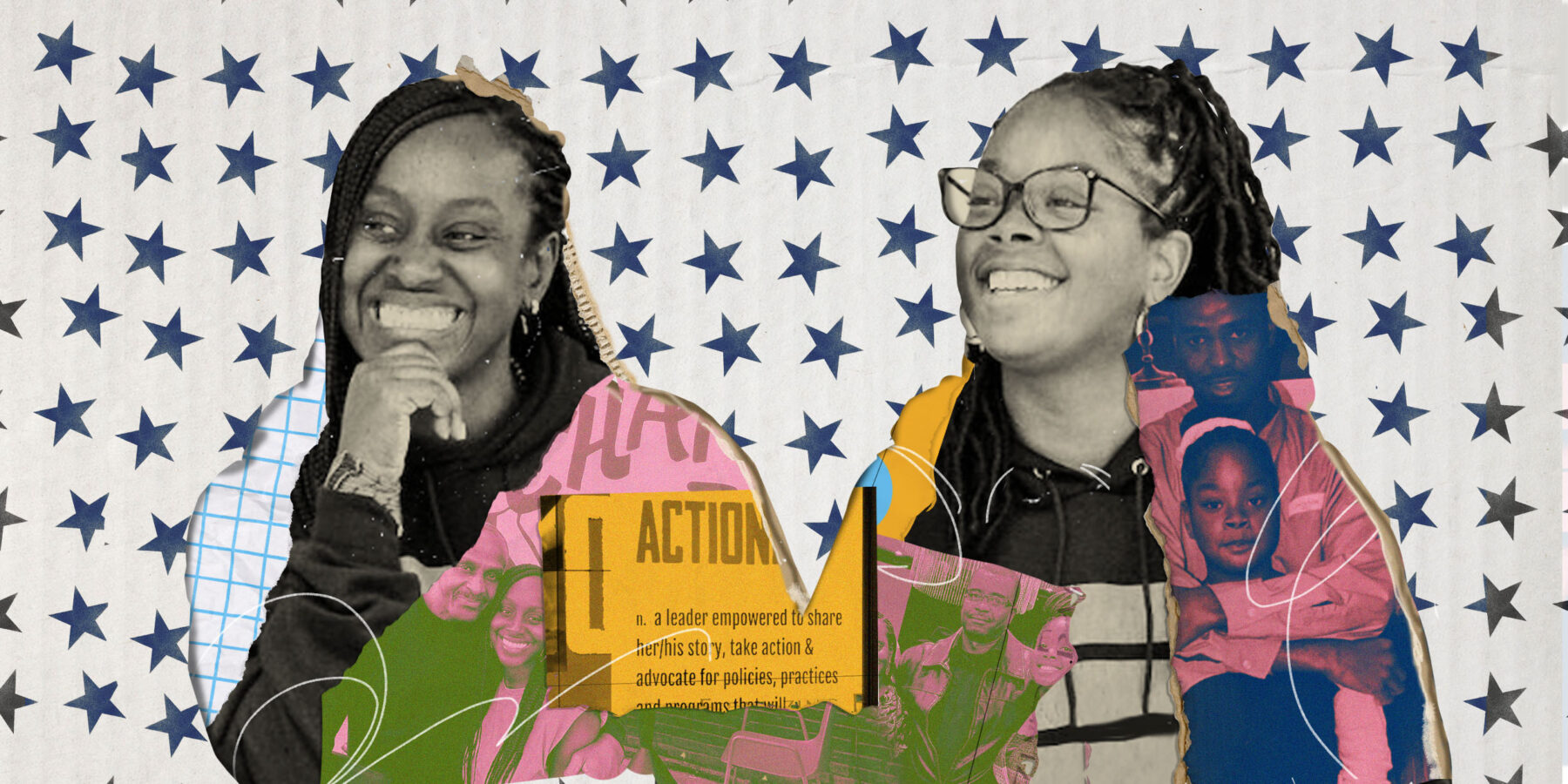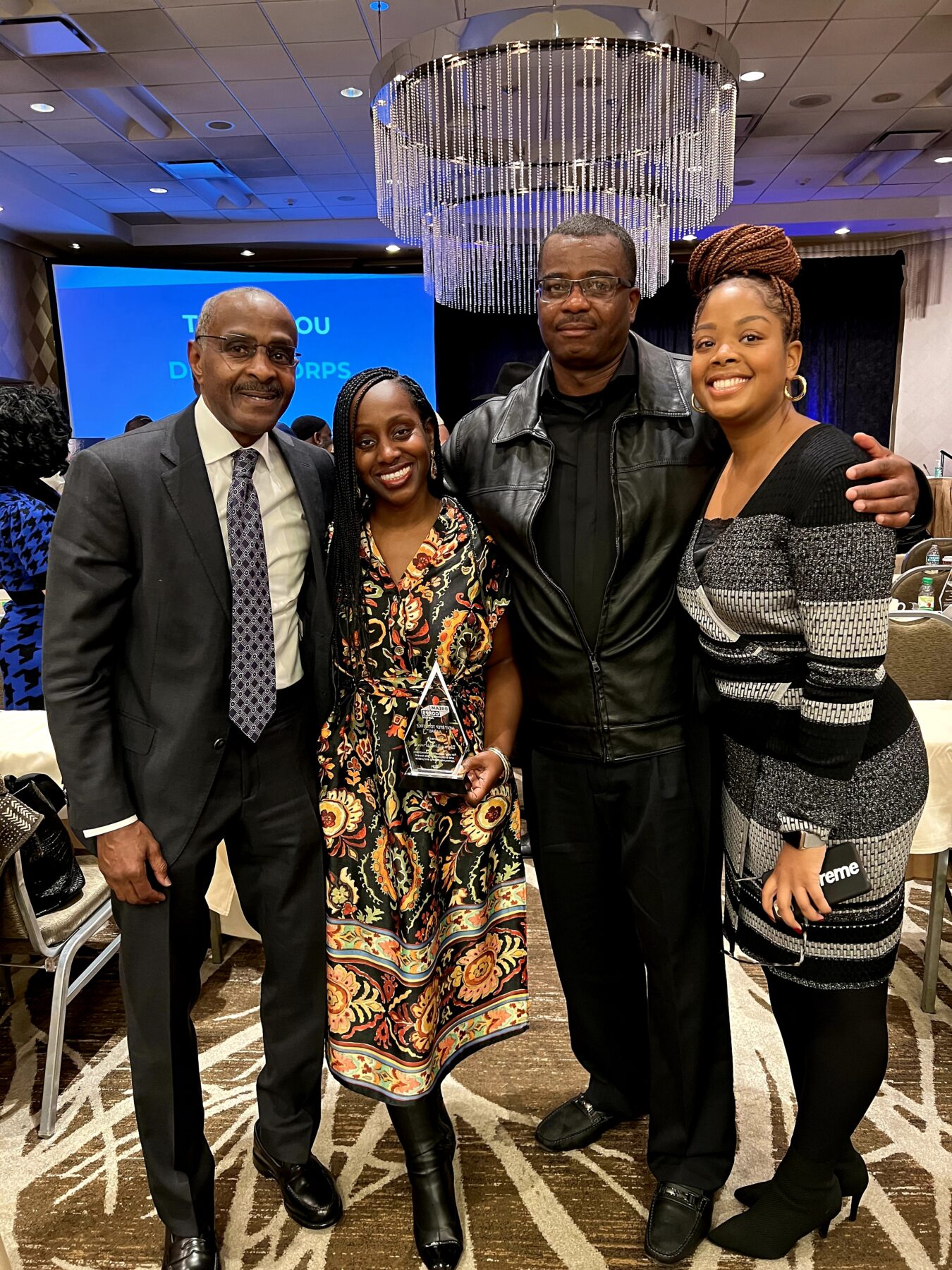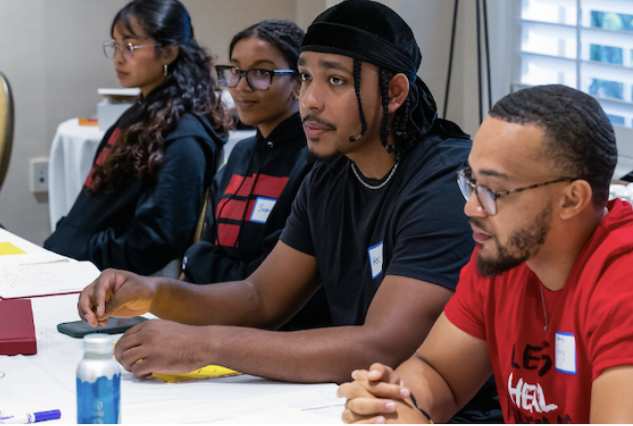
Three years ago, at the height of the pandemic, Ashley Jackson finally saw her father in clothes that weren’t a prison uniform. She walked toward him, her grandmother at her side, as he was escorted toward the prison entrance. The tears didn’t come, though, until she watched her grandmother hold him tight. At that moment, she realized her father was coming home.
Jackson, now 34, was only 6 months old when her father was sentenced to life in prison on drug and weapons charges. For much of her adult life, she has been advocating for his release, most recently with the help of the youth-led nonprofit organization We Got Us Now.
“At the time, his case was so old and was falling through the cracks, but We Got Us Now helped bring more light and visibility to who he was and is as a human being,” Jackson said. “I always had hope, and now I feel like I got a second childhood.”
More than 5 million children in the United States have experienced parental incarceration in their lifetime, according to the Annie E. Casey Foundation’s Kids Count Data Center. We Got Us Now is trying to change that. The organization’s mission is to bring awareness to children of incarcerated parents and the stresses they face by empowering them to educate leaders, schools and policymakers through their personal stories. Success is the reunification of families impacted by incarceration, but the organization’s ultimate goal is to create fair sentencing and end mass incarceration.

“This experience can be extremely lonely, which is why we are now with our bullhorns saying this is a completely forgotten population of children affected by parental incarceration, without many outlets to share our own stories and to be in community with one another,” Jackson said.
Ebony Underwood, the founder of We Got Us Now, said the stress and pain of having her father behind bars was the main reason she created the organization. In the six years since its inception, she has helped pass legislation at the local, state and federal levels, including New York laws that require the state to place incarcerated parents in facilities close to their children and to make phone calls free for families.
The organization has also helped reconnect hundreds of families around the country separated by incarceration. In 2021, she was able to bring her own father home after 33 years in prison.
“It’s a pivotal issue that deserves much more light, and I wanted to build a community for this historically invisible community,” Underwood said. “It’s an ode to my personal life: ‘We Got Us Now’ because we needed to have us now, because if not us, then who?”
The bond shared by children of incarcerated parents
Jackson connected with Underwood through social media. They both understood what it was like to grow up with a father behind bars and to fight for their release.
Jackson said she was always aware her father was in prison. She remembers her family packing into a 15-passenger van and traveling hours before dawn to get to one of the many correctional facilities her dad had been moved to, some that were 350 miles away from her home in North Carolina. While having an incarcerated parent was all she knew, she said his absence really started to weigh on her as a teenager.
“The effects of having an incarcerated parent is extremely heavy on a child, and you feel a huge sense of loneliness,” Jackson said. “We don’t talk about what it’s like for a child to travel several hours or across the country on a weekend and then go to school on Monday morning without having time to process.”
Underwood said there were days when she, too, lost hope and thought her father, who was also sentenced to life on drug charges, would never get out. She had spent most of her life getting to know him through visits, letters and calls while he was in prison.
“There’s nothing that can replace a parent’s hug,” Underwood said. “There’s nothing that can replace the love of a parent and being able to see them in person.”

Through their bond, Underwood invited Jackson to join We Got Us Now’s Actionist leadership program. The Actionists program is a six-month curriculum that includes a three-day healing retreat where children of incarcerated parents have the opportunity to focus on their well-being, share their stories, attend advocacy training workshops and learn skills like public speaking. They then take what they learn and educate students, administrators and policymakers on justice reform.
Today, there are 25 Actionists across 14 states who speak at colleges and universities about the history of mass incarceration in the U.S. and the negative effects of having a loved one in prison, including the economic and mental strain on families. Underwood said after their talks, students have come up to them and shared similar experiences as a child of an incarcerated parent.
“Letting people know that there is an organization that exists nationally to help them navigate what they were or are experiencing has been the most impactful for me,” Jackson said.
How parental incarceration impacts kids
Kristin Turney, associate professor in the Department of Sociology at the University of California, Irvine, said one of the biggest strains on children of incarcerated parents is financial. She said many costs are associated with incarceration and maintaining connections, including phone calls, bail, attorneys, commissary accounts and fines associated with a conviction. However, the biggest financial loss is living without the income of the incarcerated family member, who often was the breadwinner.
“Their incarceration leads to their removal from the labor market and their removal to make any sort of financial contributions to the family while simultaneously increasing costs for the family,” Turney said. “Money is really important for a child’s well-being.”
Parental incarceration also has an impact on children’s mental and physical health. There’s a sense of abandonment, loss and grief, which can lead to depression, anxiety and PTSD, said Dr. Nia Heard-Garris, a researcher in the Department of Pediatrics at the Feinberg School of Medicine at Northwestern University. Children feeling the stigma and shame of having a parent behind bars often don’t have the space to talk about what they’re going through.
“For a long time, I grappled with this feeling of not knowing what to do with all these emotions and not knowing how to navigate it,” Underwood said. “There are no instructions for when a family member becomes incarcerated.”
Underwood said feelings of isolation and grief become normal as a child of an incarcerated parent, and she emphasized how important it is for people like her not to feel alone.
“Our mission is to educate different sectors and let them know that this is an issue that is important, an issue for child well-being and one we can’t forget about,” Underwood said. “Our vision is to make sure that happens from cradle to college.”
How We Got Us Now reunites families and educates communities
After training as an Actionist, Jackson began to hear that Covid cases were rising at the Butner Federal Prison in North Carolina, where her father was held. It felt even more urgent to bring her father home. With the help of We Got Us Now, she shared her story on social media, spoke to reporters, appeared on podcasts and conducted hundreds of hours of research on ways to get her father an early release. She wrote petitions and participated in Board of Corrections panels and hearings.
A year later, the two were finally reunited.
“It was an emotional roller coaster over the years, but I still never felt that my dad would die in prison,” Jackson said. “It’s still so surreal.”
Jackson continues the work she learned through the Actionists program as the director of operations at We Got Us Now. Her father, Orrin Jackson, also does advocacy work with criminal justice organizations like the Exodus Project and Dream.org.
“She had no living memory of me being home, which made her advocating for me that much more remarkable,” Jackson said of his daughter. “We now advocate for those we don’t know because we share their experience, pain and suffering.”

Together, they have testified on Capitol Hill regarding the Equal Act of 2021, which would eliminate the federal sentencing disparity between crack cocaine versus powder cocaine offenses. The former often affect lower-income communities while the latter often affect more affluent ones and come with lighter sentences — currently, 28 grams of crack cocaine and 500 grams of powder cocaine results in a sentence of a minimum of five years without parole. The proposed Equal Act hasn’t been approved by the Senate.
“After his release, I became even more fired up to continue to do this work in a more impactful and strategic way,” Ashley Jackson said. “I’m proud to say that my dad has continued to do this work with me.”
Underwood and Jackson hope that other children going through what they did will find the support and community they’ve helped build.
“This work is so personal for me,” Jackson said. “We’ve lived it for so long, and my goal is to serve this organization and ensure that the generation coming behind us does not have to experience some of the same things we’ve experienced.”


